An Online Fire Science Associate’s Degree can prepare you for many different jobs, including firefighter, arson investigator and emergency services specialist.
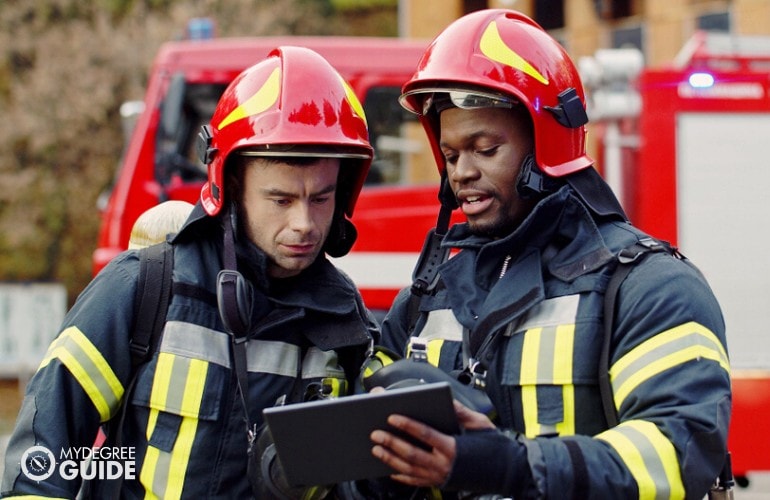
Editorial Listing ShortCode:
You won’t even need to attend classes on campus. You can get this degree from the comfort of your own home through an online program.
Online Fire Science Associates Degree Programs
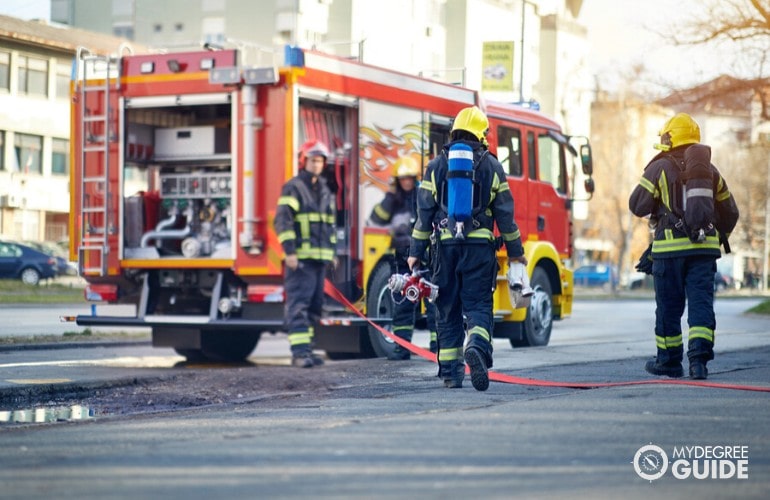
Fire science is a more complex subject than you might think. As a wide-ranging field of study, it can cover everything from the chemical composition of a blaze to the different techniques for preventing, suppressing and investigating it. It can also draw from related fields like medicine and public health education.
Editorial Listing ShortCode:
There are several ways to study fire science. It’s available at almost every level of schooling, but different programs can send you down different career paths.
Firefighter
If you want to become a firefighter, an associate online degree in fire science is a good choice. While most fire departments only require a high school diploma and specialized training through a fire academy, a degree can set you apart from other job applicants in a competitive market.
Forensics, Investigation, and Evidence Collection

If you want a technical, highly specialized job like forensic investigator, you’ll need advanced qualifications like a bachelor’s degree.
You might also benefit from extra certifications like Certified Fire Investigator (CFI) or Evidence Collection Technician (ECT).
Editorial Listing ShortCode:
Another option is to combine a fire science degree with a related subject. For example, many firefighters are also certified as emergency medical technicians (EMTs), and it isn’t uncommon for non-active firefighters to branch out into public education or health services careers.
You don’t have to decide right away. This goes for your degree level, too. If you get an associate degree in fire science and later decide to pursue a bachelor’s or master’s degree, many programs will let you apply your AA/AS credits towards your new degree instead of starting all over.
Associate’s in Fire Science Curriculum and Courses
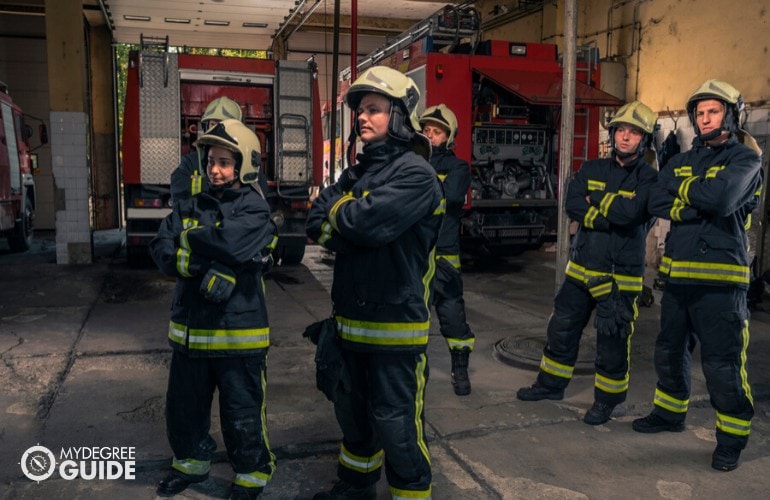
What will you study as a fire science major? A lot depends on your school. While some universities offer a straightforward fire science degree, others combine the subject with emergency response, emergency management or disaster relief. Some schools also offer specializations in things like fire engineering or emergency services administration.
If you just want a general look at your potential course list, however, here are some common classes required for a fire science degree:
- Fire Behavior: This class is known by many names, but it’s dedicated to the essentials of fuel, heat, combustion, ignition, flammability and more.
- EMT Basics: Many firefighters study EMT basics in addition to fire science.
- Fire Codes and Laws: Fire regulations can be different from place to place, and so can codes, abbreviations and other essentials for fire professionals.
- Emergency Management: You might be asked to take several classes in emergency management to broaden your understanding of disaster response and the federal and local agencies that handle it.
- Rescue Procedures: You’ll learn all about rescue techniques and strategies if you enroll in a fire academy, but some fire science programs can require them as well.
- Hazardous Materials Management: Flames aren’t the only dangerous elements of a fire, and this class can teach you how to both recognize them and dispose of them.
- Fire Protection Systems: Technology has come a long way, and the fire protection systems of today’s buildings can require certain technical skills to operate.
- Chemistry: Also known as “Chemistry of Fire Science,” this class can teach you how fires are started, suppressed, worsened and eliminated by various chemical elements.
- Fire Investigation and Analysis: These classes discuss the guidelines for site inspections as well as things like lab and courtroom procedures if you suspect foul play.
- Research Methods: Sometimes combined with a technology class, research methods can show you how to track, collect, organize and analyze fire trends and statistics.
Additionally, there are degree programs that offer fire science or fire safety as a concentration for the subject. You could major in industrial engineering, for example, with an emphasis on fire safety in architecture.
What types of things will I learn in a fire science program?
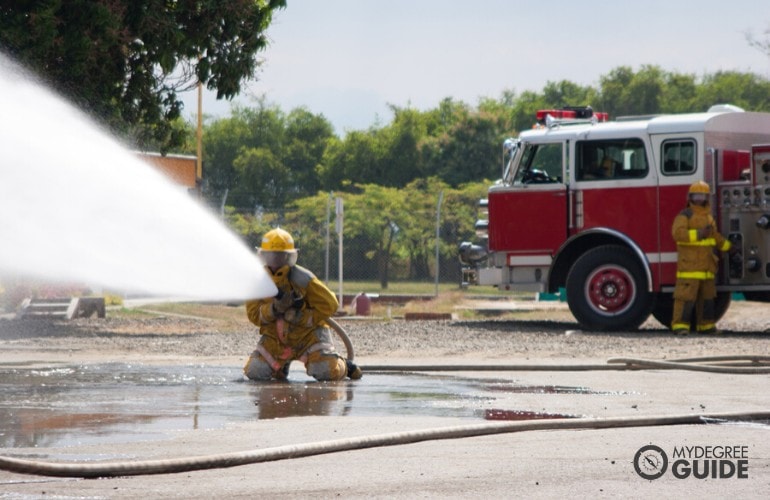
While the specifics will depend on your school, you can expect most fire science programs to cover the same fundamentals.
- Prevention: Fire prevention methods can range from building protocols to public awareness campaigns about common dangers in the kitchen. Special classes might be available for different kinds of fires such as forest fires or industrial fires.
- Suppression: Fire suppression is usually a combination of physical and chemical action. For example, you might learn about the fire triangle and how water works against it.
- Education: Many of today’s firefighters spend a significant amount of time in education and outreach programs. These classes can teach you how to take your own knowledge of fire and fire safety and share it with kids, engineers, architects, lawmakers and business owner.
- Emergency Services: There’s a vast network of emergency services out there, and your job could involve utilizing or coordinating with them. You’ll need to learn how to act quickly and effectively within these preexisting systems.
There are other areas of study, of course, including the forensics of fire investigation and the rescue methods employed by first responders. These are just the basic concepts that are covered by most fire science programs.
Fire Science Careers and Salaries
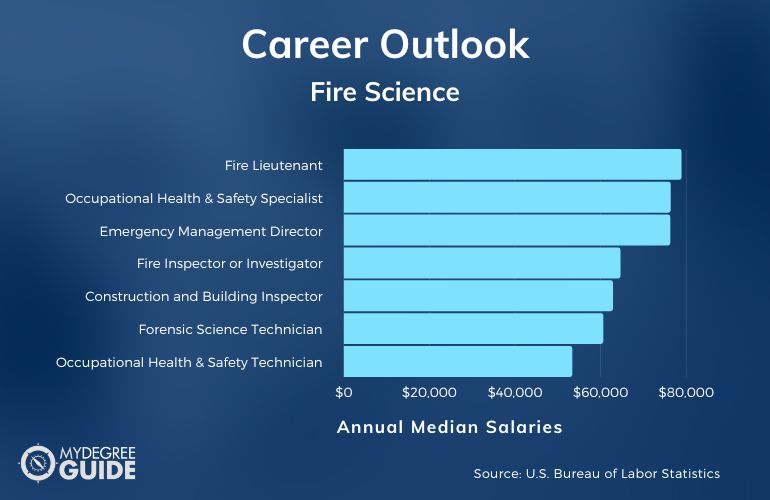
According to the U.S. Bureau of Labor Statistics, the average salary for firefighters is $52,500 per year. However, you don’t have to become a firefighter just because you majored in fire science. There are many other career paths that you can take, and they range from research-based desk jobs to intense, hands-on occupations.
According to the Bureau of Labor Statistics, some careers in the fire science field include:
| Careers | Annual Median Salary |
| Fire Lieutenant | $78,870 |
| Occupational Health and Safety Specialist | $76,340 |
| Emergency Management Director | $76,250 |
| Fire Inspector or Investigator | $64,610 |
| Construction and Building Inspector | $62,860 |
| Forensic Science Technician | $60,590 |
| Occupational Health and Safety Technician | $53,340 |
| Firefighter | $52,500 |
| Wildfire Prevention Specialist | $42,150 |
| Forest and Conservation Technician | $38,940 |
Please note that salaries can vary depending on things like age, location, experience and educational level. For example, a first-year fire investigator makes an average of $39,860 per year, but a fire investigator with 20 years of experience can take home as much as $100,780 per year.
Depending on the employer, you may need additional education or work experience to qualify for some of these jobs.
Editorial Listing ShortCode:
States pay their firefighters at different rates as well. In New Jersey, they make an average of $86,880 per year. In North Carolina, they make an average of $34,230 per year.
Accreditation
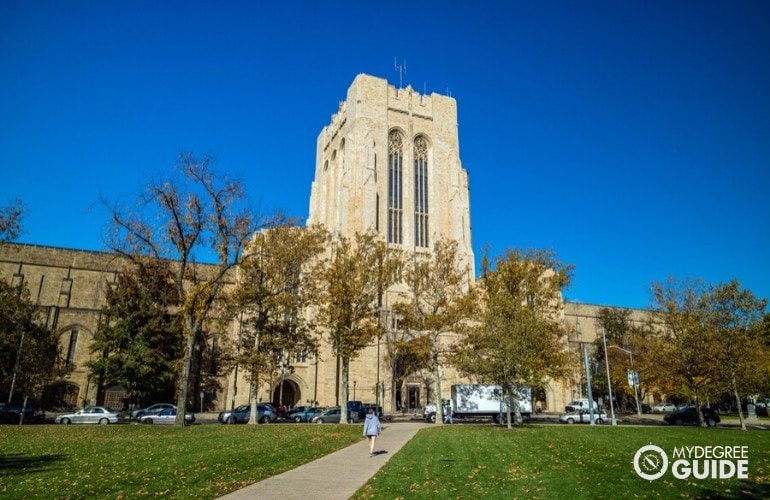
An accredited university is one that’s been through a review process. It isn’t a scam, and it meets the educational standards that have been set forth by places like the U.S. Department of Education.
There are many accrediting boards, and there’s even a board that oversees the other boards. It’s called the Council for Higher Education Accreditation (CHEA), and they have a searchable database on their website if you want to look up a school and see if it’s been approved.
There are three types of accreditation:
- Regional accreditation comes from six institutions that have divided the U.S. into regions. It’s the most common type of accreditation. Examples include the New England Association of Schools and Colleges (NEASC) and the Middle States Commission on Higher Education (MSCHE).
- National accreditation is given to trade schools, vocational schools and religious schools. The Association for Biblical Higher Education Commission on Accreditation (ABHEC) is one example. Another is the Association of Institutions of Jewish Studies (AIJS).
- Programmatic accreditation is for specific degree programs. This comes from industry-focused organizations such as the American Culinary Federation (ACF) and the American Library Association (ALA).
You should think long and hard before enrolling in an unaccredited school. Not only can it hurt your job prospects, but it can also impact things like the financial aid that you receive.
Financial Aid

Financial aid is a necessity for many college students, so if you need a little help to fund your degree, you aren’t alone.
The first thing to do is fill out the Free Application for Federal Student Aid (FAFSA). It won’t cost you anything, and it’ll let you know if you’re eligible for any forms of assistance, including:
- Grants
- Loans
- Work-study programs

Generally speaking, your income level will determine the amount of aid that you receive, but you could also get money for special circumstances like the death of a military parent or enrollment in a high-need teaching program.
Editorial Listing ShortCode:
You can also look into scholarships to help you pay for college. You don’t have to be a four-year student. There are many scholarships for medics, firefighters, first responders and other emergency personnel, and a number of them will cover associate degrees and professional certifications.
Professional Organizations
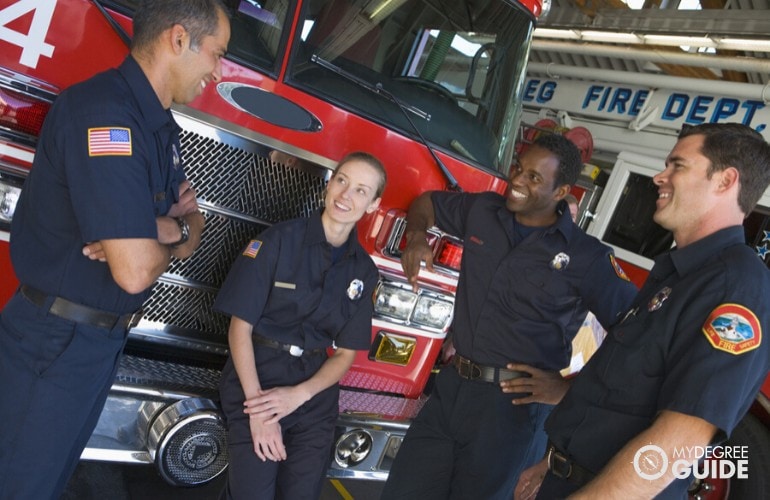
Professional organizations can provide a lot of resources for college students. They can also help you with the transition into post-graduation employment. Here are just a few organizations that accept fire science majors:
- International Association of Firefighters: With more than 300,000 members, the IAFF is a wide-ranging network for firefighters, paramedics and other emergency responders.
- International Association of Arson Investigators: The IAAI is for fire investigators of all types, and it offers news, updates, certifications, training programs and insurance options for both students and professionals.
- Federal Emergency Management Agency: FEMA is an agency of the U.S. government. You can’t join it like a club, but you can apply for a job or explore student opportunities for internships and volunteer work.
If you’re interested in these organizations, don’t be afraid to reach out and get in contact with them. You don’t have to be a current college student just to send an inquiry.
Can You Get A Fire Science Degree Online?
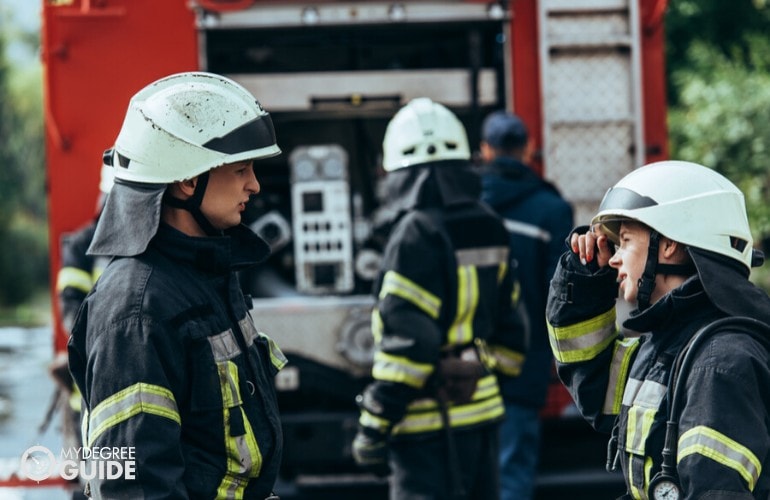
There are many online degree programs for fire science. As a bonus, most of them are 100 percent online, meaning that you can complete them without any physical, in-person requirements.
In addition, there are on-campus and online accelerated fire science degree programs that can allow you to finish your degree quicker than you normally would.
What Can You Do With An Associate Degree In Fire Science?
An associate degree in fire science can qualify you for many jobs. The most obvious career path is a firefighter, and it doesn’t even require a college degree; most fire departments only ask for a high school diploma or GED in addition to specialized training.
Editorial Listing ShortCode:
However, the competition can be fierce for firefighting jobs. A college degree can show your dedication to the profession, and it can help your resume stand out from other applicants.
How Long Does It Take To Get An Associate Degree In Fire Science?

It usually takes two years to get an associate degree. The process can be faster or slower depending on how many credits that you take per semester.
You should also consider the length of any training or certification programs that will impact your future employment prospects: Fire academies usually require around 600 hours of training spread out 12 – 14 weeks.
How Much Does A Fire Science Degree Cost?
It can be difficult to calculate the cost of a fire science degree since every school is different. Generally speaking, however, the average price for a public, two-year community college is $153 per credit (Education Data), and you’ll need 60 credits to graduate.
This puts the average cost of an associate degree for fire science at $9,180.
Schools Offering Online Fire Science Associate’s Degree Programs
Methodology: The following school list is in alphabetical order. To be included, a college or university must be regionally accredited and offer degree programs online or in a hybrid format.

Founded in 1961, Albany Technical College is a public school located in Albany, Georgia. It is a well-known scholastic institute offering traditional and online degrees in a variety of technical disciplines. They serve the counties of Baker, Clay, Lee, Randolph, Terrell, Calhoun, and Dougherty, as well as the online learning community.
- AAS in Fire Science Technology
Albany Technical College is accredited by the Southern Association of Colleges and Schools Commission on Colleges.

This public community college was founded in 1945 and is located in Casper, Wyoming. It is one of the biggest community colleges in the entire region and has national acclaim as a reputable school. Plenty of students take advantage of their traditional and online undergraduate associate’s degree programs every year.
- AAS in Fire Science
Casper College is accredited by the Higher Learning Commission.

Founded in 1965, Chattanooga State Community College is a public community college in Tennessee. It is part of the Tennessee Board of Regents System and has an impressive athletic program in addition to its academic programs. Students can get a jump start on their future education by enrolling online or traditionally at this school.
- AAS in Fire Science Technology
Chattanooga State Community College is Accredited by the Commission on Colleges of the Southern Association of Colleges and Schools.

Delta College is one of the top colleges in Bay Country’s Frankenlust Township, named by WalletHub as the best community college in California. It is well known for being an excellent school for students who want to pursue their associate’s degree or academic certificate in Michigan. It is a public school that was founded in 1935, and it currently offers traditional and online classes.
- AAS in Fire Science Technology
Delta College is accredited by the Higher Learning Commission.
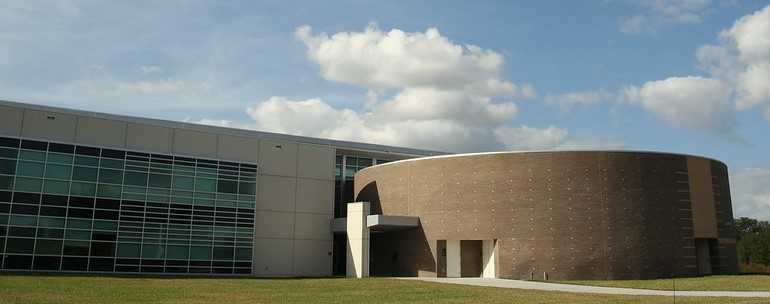
This two-year public community college is a great place to get your associate’s degree traditionally or online in Hillsborough County, Florida. It was founded in 1968 and is part of the Florida College System. Over 47,000 students attend the school every year, and they pride themselves on being focused on lifelong learning and achievement.
- AS in Fire Science Technology
Hillsborough Community College is accredited by the Southern Association of Colleges and Schools Commission on Colleges.

Founded in 1928, Hutchinson Community College is in Kansas and offers students over 70 different programs to choose from and get a head-start on their education. It’s a public institution that serves 5,000 students every year and prepares them for further education and obtaining an undergraduate or graduate degree. Students can study in the classroom or online.
- AAS in Fire Science
Hutchinson Community College is accredited by the Higher Learning Commission.

Founded in 1954, Macomb Community College is an excellent place for both traditional and online students to get their associate’s degrees. This public school is recognized by the Higher Learning Commission and helps prepare students for further education and workplace development. It’s one of the most prestigious community schools in Southeast Michigan.
- AAS in Fire Science
Macomb Community College is Accredited by the Higher Learning Commission.
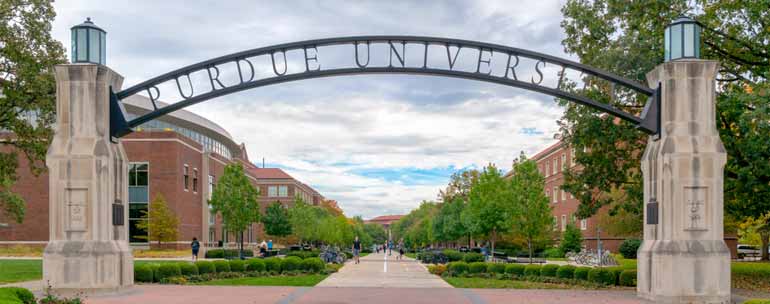
Purdue University offers associate’s, bachelor’s and master’s degrees online and in the classroom. Named by U.S. News & World Report as one of the top public universities in the country, it is located in West Lafayette, Indiana, and prides itself on addressing the individual needs of each student. Purdue University was founded in 1869 and is still going strong.
- AAS in Fire Science
Purdue University is accredited by The Higher Learning Commission.

Founded in 1967, Southern Arkansas University Tech is a fantastic place for both online and traditional students to get associate’s, undergraduate or advanced degrees. This public community college is physically located in Camden, Arkansas, and works to equip tomorrow’s workforce with the technical skills that they need to be successful.
- AS in Fire Science Management
SAU Tech is accredited by the Higher Learning Commission of the North Central Association of Colleges and Schools.
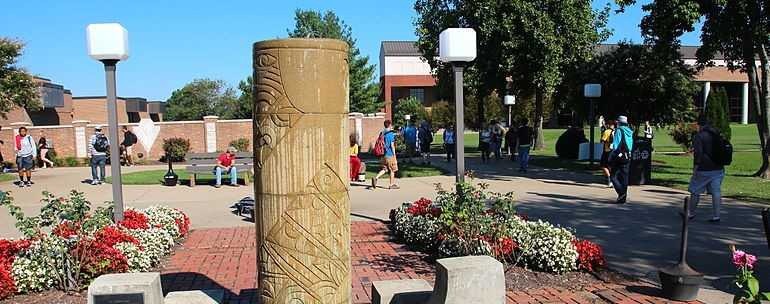
Volunteer State Community College is one of Tennessee’s most prestigious community colleges offering several associate’s degrees and certification programs both online and in the classroom. This public college was founded in 1971 and prides itself on fostering lifelong learning, promoting cultural awareness and strengthening the workforce in Tennessee and beyond.
- AAS in Fire Science
Volunteer State Community College is accredited by the Southern Association of Colleges and Schools Commission on Colleges.
Getting Your Fire Science Associate’s Degree Online
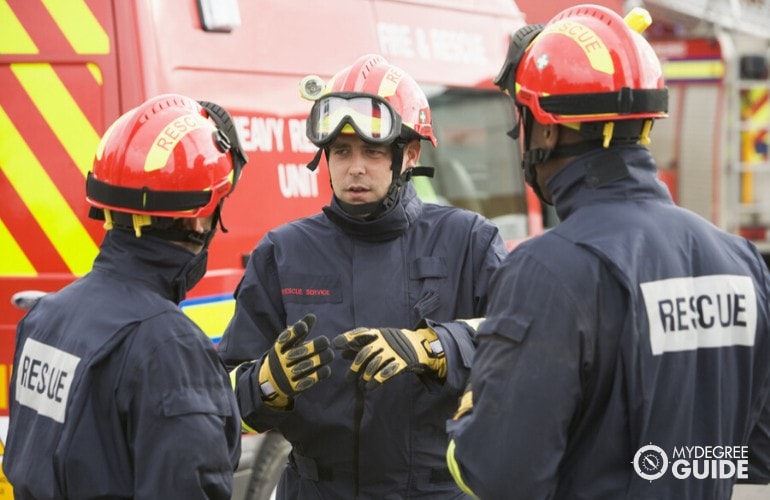
A fire science degree can greatly enhance your career prospects. Whether you’re dreaming of a firefighter’s uniform or a fire inspector’s clipboard, a college degree can give you the skills that you need to succeed. Consider enrolling in a university program to learn more.

